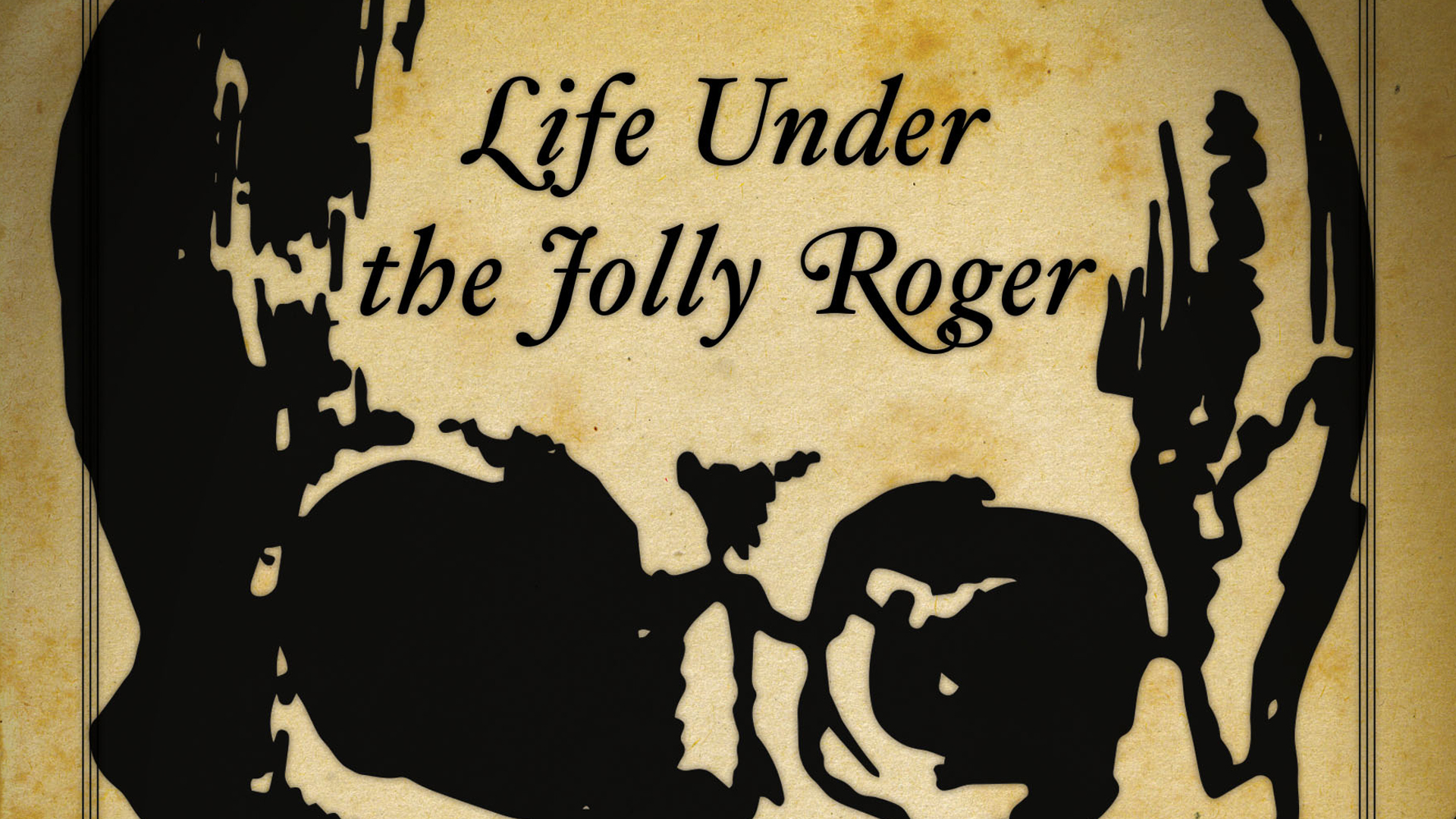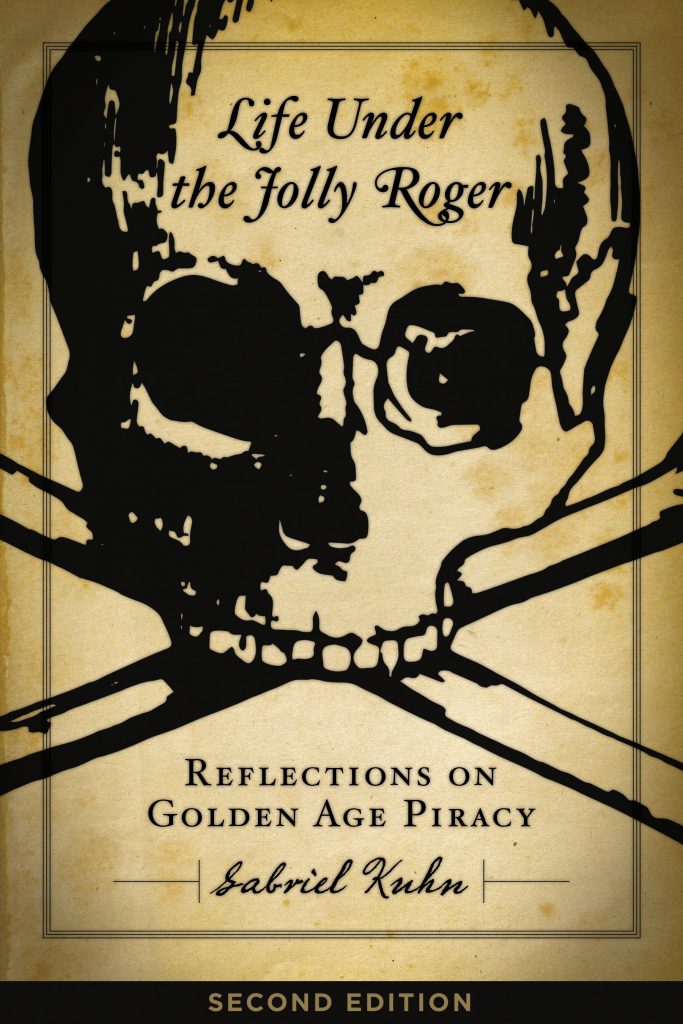no quarter: an anarchist zine about pirates
March 21, 2010
Interview with Gabriel Kuhn in NQ#5
This interview with Gabriel Kuhn was conducted via email in later 2009. His excellent book Life Under the Jolly Roger: Reflections on Golden Age Piracy was published by PM Press (pmpress.org) in January 2010. I highly recommend it.
How and when did you first get interested in pirates and the golden age of piracy?
As a child, like so many others. I was always fascinated by the outlaw image of pirates, I had pirate toys, I dressed up as a pirate, etc. Incorporating that fascination into my work later on just seemed to be a natural step, if you will.
I first encountered your writing when I read “Life Under the Death’s Head: Anarchism & Piracy,” in the book Women Pirates and the Politics of the Jolly Roger by Ulrike Klausmann, Marion Meinzerin and yourself (published by Black Rose in 1997). What’s the relationship between that essay and the new book?
I think there are clear similarities in how I try to look at golden age piracy through a variety of social, political, and cultural theory. The big difference is that I now know much more about piracy than when I wrote that essay. This has changed my outlook in several ways. In the essay I used golden age piracy mainly as a historical backdrop onto which I projected a few general ideas about radical politics. Doing justice to the actual history of golden age pirates was much less important than propagating political beliefs.
At the end of the essay I say something like, “I know I will be accused of romanticism, but I don’t care.” A very flippant remark, of course, but, well, it gives you an idea of the mindset I had.
This book takes a different angle. It tries to tie certain political ideas – which are very similar to the ones in the essay, not much has changed here – much more to what the golden age pirates’ reality might have actually been like. So the assessment of their politics – rather than the projection of ours as contemporary radicals – plays a more important role. One consequence of this was that most of the romanticism went out the door…
Let me pick up on this. I think that perhaps the most important thing about Life Under the Jolly Roger is the way you engage with works of radical piratology critically. I feel like you are very quick to acknowledge the strengths of the works, but also argue very strongly against what you feel they got wrong. These are often very important differences (the interpretation of the story of Captain Mission and Libertalia, and the relationship between pirates and slavery being just two examples out of many). Why is it so important to correct these idealizations? Why is it so easy to make these kinds of mistakes?
Well, personally, I wouldn’t even speak of mistakes. I think one of the aspects that make work on golden age piracy so difficult – and so intriguing – is the lack of first-hand sources. We have no letters, diaries, or logbooks of pirates, no accounts of people who traveled with them or who studied them at close hand. In short, apart from the traceable material facts (approximate numbers, areas of operation, ships used, etc.), there is very little certainty when it comes to the life of golden age pirates, their motives, their social relations, their political and ethical beliefs, etc. All we can do is read the “circumstantial evidence” (newspaper clippings, court transcripts, navy records), relate it to what we know of the era’s general history, add our perception of how humans behave under certain circumstances, and then come up with a picture that seems convincing and believable to us. Now different scholars will come up with different pictures, but that only makes everything more interesting.
But to answer your question about idealizations and why I find it important to correct them: I think mainly because I want a radical political movement to be a credible movement; a movement that has to be taken seriously by its opponents on an intellectual and theoretical level. Now don’t get me wrong, there is a place for romanticism: romanticism inspires, motivates, and reassures, and that’s all great. But I also think that there is a place for serious examination where we take a step back, breathe out, and say, “Okay, let us look at how things might have really been…” And on this level I think the ability to be self-critical is tremendously important. It makes for better discussion among ourselves as radicals and for a more productive exchange with people whose politics differ.
Are you worried that people will get offended by your critiques – either the writers themselves or radicals who hold some of these idealized notions about golden age piracy very dearly?
I am a little worried that some of the writers might misinterpret my intentions, because I’m really not out to disrespect anybody’s work. I wouldn’t even say that I’m criticizing much, at least not in the sense of saying that someone is “wrong” on this point or another. The work of Marcus Rediker, Peter Lamborn Wilson, or Stephen Snelders is fantastic, there is absolutely no doubt about that, and my work builds almost entirely on theirs. Most importantly, I see them as authors who share similar political ideals, and this is much more significant to me than whether we share the same view on the ethics or ideals of Blackbeard or Bartholomew Roberts.
For me, when I differ from their interpretations, it’s just about different perspectives, and about a lively, constructive debate. This is what I believe takes us further as radicals interested in historical analysis and political theory. Let us take Marcus Rediker’s Villains of All Nations as an example. It is without any doubt the most accomplished book written on golden age piracy, particularly from a radical angle. Of course we could just be like, “Alright, Marcus Rediker has said it all, and that’s that on golden age pirates.” But I think that’d be rather boring, and I can’t see Marcus Rediker wishing for that either. Radical discussion needs new takes and new thoughts, and I hope I’ve been able to formulate some in this book. Whether they’ll make sense to readers and will be considered contributions to a valuable debate is for them to decide, but I think it’s necessary to try. Radical discussion must never stop or it ends being radical.
Am I worried that I might offend some readers? To be honest, I haven’t given that much thought. I guess I assumed that it’s clear enough that I’m writing from a radical perspective and that I’m raising questions as a comrade and not as a foe. If people don’t agree with me and think that I am too negative in my view of golden age pirates, that’s perfectly fine. I’m glad that there are different positions. I just wish for respect and solidarity.
You wrote: “Perhaps there was neither anarchist nor revolutionary consciousness among pirates of the golden age – but they certainly carried anarchist and revolutionary momentum” (75). Could you elaborate on what you mean by that?
I just think that it’d be hard to make a convincing case that golden age pirates were very much concerned with universal values of equality and justice or with creating a better world for all. All considered, it just doesn’t seem plausible to me. Their motivating factors rather appeared to be an individual escape from oppressive structures and the pursue of a joyful life. However, this does not mean that there was nothing revolutionary about them. “Lack of consciousness” has probably been overrated as a dividing line between people who deserve the revolutionary attribute and those who don’t. To me, there does lie a revolutionary – and anarchist – element or potential in the rejection of oppressive structures and the pursue of a joyful life, no matter how “individualistic.” No one can take this away from the golden age pirates, and I think it’s what inspires radicals to this day. So even if golden age piracy probably cannot be called a “liberation movement” based on revolutionary “consciousness,” it carries what I would call a revolutionary element, potential, or, well, “momentum.”
You use the work of a number of people that might not be obvious when examining the golden age of piracy. Deleuze and Guattari, Pierre Clastres, and Nietzsche, for instance. Why did you use this approach?
The answer is pretty simple, I think: I did a philosophy Ph.D. and I have always enjoyed reading theory. At the same time, I’ve always wanted to tie theory to issues that seemed relevant politically, instead of ending up in very isolated academic dialogue. My relationship with academia has never been easy, and I have had very little to do with it since finishing my university studies almost fifteen years ago. If you will, this book is an example of trying to make theory meaningful not only to academics but also to people who share common interests – in this case, an interest in pirates and/or radical politics – but never had the time or motivation to read up on this stuff. Among the nicest compliments I can get is someone telling me, “This is the first time Foucault (or whoever) really grabbed my attention.”
Ultimately what lessons do you think radicals can draw from the golden age of piracy?
I lay this out in more detail in the last chapter of the book, but the core aspects are: 1. The rejection of authority and of dominant social norms. This seems an essential aspect of any radical engagement. 2. The golden age pirates’ internal social structure that stands as an extraordinary experiment in egalitarianism and direct democracy. It’s not to be idealized as it was exclusive, i.e. the guiding principles were only shared among crew members and did not extend to others, but it is nonetheless a shining and inspiring example of radical self-determination. 3. The “libidinal” dimension of golden age pirate life which I consider indispensable for making radical politics attractive. You gotta have fun being a radical. A boring society is hardly worth fighting for, and it will not endure either. It’s like that famous Emma Goldman quote, “If I can’t dance, I don’t want to be part of your revolution.” I think the golden age pirates were always up for a good dance.
Besides these central points, there are a few other aspects: For example, the “Temporary Autonomous Zones” that the pirates created in the sense of Hakim Bey. Then their challenge to the control of space which renders terms like “pirate radio” very apt. And a number of important economic aspects, like the rejection of both the wage labor system and capitalist production (which allows to draw interesting parallels to modern-day dumpster divers, freegans, etc.), or the undermining of ownership rights (which today continues in the form of piracy as “copyright violation”).
There are a lot of lessons to draw from golden age pirates for contemporary radicals, no doubt. As I argue in the book, though, the decisive question is how we can turn these lessons into effective politics today. The golden age pirates are no model for a free and just society for all, due to ever changing historical circumstances, their own contradictions, and also their special relationship to the sea. They carry the said revolutionary “momentum,” but today this has to be brought to life by those who want to defend this legacy. In this context, crucial is not whether the golden age pirates were revolutionary, but how we and future generations can keep their legacy a revolutionary one. This has no longer to do with projection – it is a matter of adaptation.
What do you think about contemporary piracy, especially off the coast of Somalia?
I know very little about it. I don’t think it has much to do with what I’m studying in this book, because for me the central feature of the golden age pirates is their lack of home, their “nomadism,” if you will. All that the golden age pirates really had were their ships. They came indeed, as the traditional pirate greeting indicates, “from the sea.” This distinguishes them from all other famous pirate communities, including the North African corsairs in the 16th century, the pirate syndicates of the South China Sea in the 19th, or contemporary pirates along the Horn of Africa.
To me, the approach of studying the latter wouldn’t differ much from the general study of bandit groups with strong roots and acceptance in local communities. Personally, I think that the work of Eric Hobsbawm remains unsurpassed here. Of course there are tactical and strategic differences between bandits operating in the desert, in the forest, or on the sea, but the overall social dimensions of their actions are very similar, I believe. It is the nomadic character of the golden age pirates that makes them a unique social phenomenon and demands specific analysis.
But to give you an answer about Somali piracy based on the little I do know, I would say that it is a consequence of three overlapping factors, namely a dire social situation, war, and imperialism. Somalis wouldn’t turn to piracy in the same numbers if it wasn’t an economic necessity; they wouldn’t have the weapons and the militaristic know-how if they hadn’t been surrounded by war for nearly two decades now; and they had less justification for their attacks if there wasn’t a sense that international maritime trade was plundering their resources. Whether this creates a social movement of sorts with promising political dimensions, I’m not sure. There are certainly anti-imperialist and anti-colonial aspects, and there is a sense of self-determination, but I don’t know whether we’re looking at any attempt here to actually alter the structure of Somali society. It is certainly an interesting development to observe for anyone interested in piracy, and we will see where it is headed.
In addition to Life Under the Jolly Roger you’ve written a lot! You have a forthcoming book of Gustav Landauer translations on PM Press. Also a forthcoming book about hardcore, straight edge, and radical politics on PM as well. You translated Klaus Viehmann’s Prison Round Trip, wrote a pamphlet on anarchist football (soccer) and more I’ve missed. And that’s just your English language output. It seems like you’re even more prolific in German. What ties all your work together?
A passion to work with texts in whatever shape or form. Not to sound corny, but I’ve loved writing and putting together journals since I was very young, and this just seems to be a continuation. Whether it’s working as an author, translator, or editor, it’s all fun to me. Obviously this doesn’t mean that things automatically turn out great, but it means that I keep on trying. Since I’ve been able to strongly focus on publishing work over the last few years – after a decade of permanent traveling which drew a lot of time and energy – I guess I’ve been able to get a few projects done.
As far as the different themes go that I’ve been working on – whether it’s pirates, straight edge, anarchist history, or soccer – I would say that with almost everything I’m interested in I eventually reach the point where I’m asking myself how I could turn this into a publishing project. Then I develop ideas, and if I’m lucky enough some publisher picks them up.
So why did you want to write this particular book, and why now?
To be honest, this book would not have been written without Ramsey Kanaan, the founder of PM Press. Whether he’ll live to cherish or regret this, I don’t know, but the book really was his initiative.
I knew Ramsey from distributing Alpine Anarchist pamphlets through AK (Alpine Anarchist Productions is a DIY publishing project I founded in 2000), and when he started PM we exchanged ideas on a few possible projects. In that context, Ramsey brought up Women Pirates and the Politics of the Jolly Roger, the book that you mentioned before, and asked whether I wouldn’t want to do something on pirates again. I hadn’t given working on pirates a thought in a long time, but it seemed like a fun idea and I went to work. It took a little while before I knew where I was heading, but not least thanks to Ramsey’s interventions, I eventually embarked on a path that felt right. As far as the outcome is concerned, that’s for others to say.
Any last comments?
Thanks for the invitation to contribute to No Quarter, and keep up the important work! The internet is fine and all, but a vibrant underground culture needs some good old zines!







